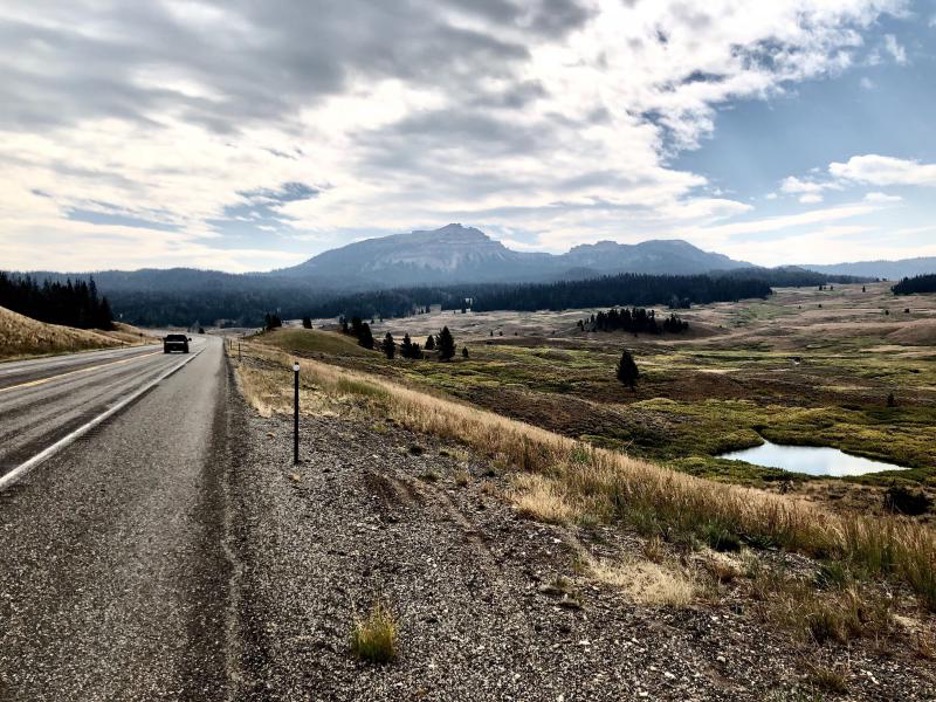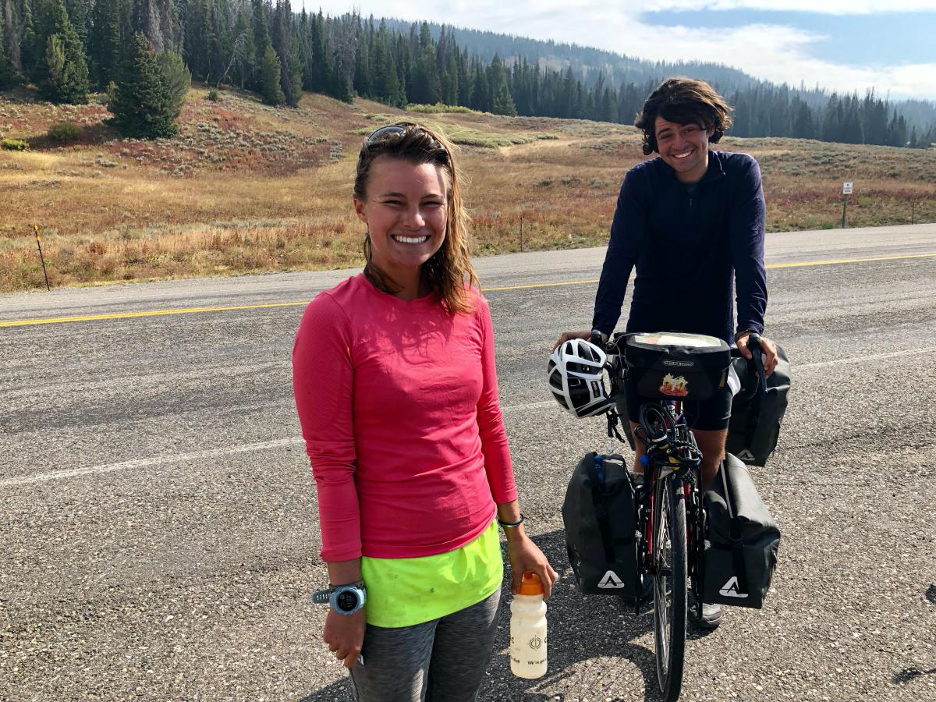RPCV on the road again — on her bike!
Days 10, 11 & 12: A Winter Storm And No Power
By NATE HEGYI

The view from Togwotee Pass of the Continental Divide. Nate Hegyi /Mountain West News Bureau
Nate Hegyi, rural reporter for the Mountain West News Bureau, is embarking on a 900-mile cycling trip crisscrossing the continental divide in August and September, interviewing and listening to Americans ahead of the 2020 election.
September 5-7: Driggs, Idaho to Dubois, Wyoming, 48 miles
I’m being chased by a cold front, which threatens to bring snow and freezing temperatures across the northern Rockies. Winter is coming and I’m in the high country. Alpine meadows and tall, green pine are smudged by wildfire smoke drifting in from nearby Yellowstone National Park.
But I have a stiff tailwind and my legs feel good – I took two days off from reporting over Labor Day weekend to spend some time driving around the parks with my fiance, Christine, who came down from Missoula with our three-legged dog, Gilly.
But now they are headed home and I’m riding 40 miles over the continental divide to reach Dubois, Wyoming before the storm hits mid-afternoon.
The road has wide shoulders and great views of the mountains. It’s often traversed by bicycle tourists like myself because it’s part of the TransAmerica route, established by the nonprofit Adventure Cycling Association nearly five decades ago. Sure enough, as I’m cresting a hill I see a rider in the distance.

[RPCV] Lea Ritson and Matteo Schlitz are both cycling across the country. Nate Hegyi /Mountain West News Bureau
“This is my first time out West,” she says. “I feel so little. It’s so humbling and the landscape is just dramatic.”
Ritson grew up in Baltimore, Maryland. She was serving in the Peace Corps when her term was cut short by the pandemic. She spent some time at home with her parents, watching the news and feeling terrible. The country was torn apart politically. So, adrift from her job, she set out on a bicycle to ride from Norfolk, Virginia to Astoria, Oregon. It restored her faith in America.
“The people have been the greatest part. I call them my trail angels,” she says. “People that go out of their way to make sure I’m comfortable and well-fed. The kindness of strangers has gotten me this far.”
As we’re chatting, another cross-country rider, Matteo Schlitz, pulls over. He’s a recent college graduate with a friendly grin and a mop full of curly black hair. He also grew up out East and says bicycling across America has allowed him to have conversations with people that have more conservative political persuasions than his own.
“Back in D.C., if you were a supporter of Trump you were evil,” he says. “It’s been cool to meet Trump supporters that I don’t necessarily agree with but have been very, very good people with good hearts.”
I tell them about my recent theory that there are a million different Americas, and maybe that’s why we are at odds with each other. We understand our own communities but we struggle to empathize with other communities outside of our bubble.
Some rural, conservative folks I’ve met struggle to grasp why some people in cities are advocating to defund the police, for example, while progressive urbanites might shake their heads at a Wyomingite who champions limited government and self-sufficiency. Schlitz says the “million Americas” theory rings true for him.
“You realize, riding, how each state has their own needs and how they live very different lives,” he says. “So you can understand why everyone is having such disagreements.”
Our understanding of other Americans, it appears, often comes from the media, television or the internet. When we travel, we regularly do so in cars or airplanes, staying at hotels and sampling other regions like they are cheeses on an appetizer tray. We go to that one great barbeque spot, or the gateway community near a national park, or maybe we’re just hurtling through a state on our way to some other destination.
Bicycling allows you to see the “contours of the country,” as the writer Ernest Hemingway once said. Your speed is similar to that of someone on horseback. It was the way we experienced the world for centuries before the invention of the automobile. Maybe we’ve lost something by moving so fast.
As the winter storm creeps in and the sky shifts from hazy into a mean-looking gray, we say our goodbyes. They ride towards Grand Teton National Park and I huff up the 9,600-foot Togwotee Pass, crossing the continental divide for the first time on this trip.
This is the spine of the continent. In the early years of America’s creation, it was viewed as insurmountable and the founding fathers believed there would be two Americas – a country on the eastern side of the Rockies and a country on the western side – which shared values but did not share a government. Ingenuity, railroads and waves of settlement that displaced the land’s first people put that belief into the grave. Now I can cross the divide on a two-lane highway with wide shoulders.
But as I’m beginning my descent, my bicycle wobbles. That’s strange. I stop, reach around and squeeze the back tire. It’s soft. I’m hoping the change in elevation messed with the tire pressure so I pump it up and continue cruising down. Fifteen minutes later, however, the tire is losing air again. Definitely a flat.
I’m about 25 miles from Dubois. The cold front is chasing my tail and I don’t want to be surrounded by snow, with freezing fingers, trying to fix the tire. I’m pretty good at fixing my bike but those kinds of jobs take time.
So I limp along, pausing to repump the tire every few miles. I’m lucky it’s a slow leak. The landscape shifts from alpine forests into red rock badlands as I finally pull into town. The wind is picking up and blowing dirt and sand across the street. I grab a room at a bear-themed motel just as the tire loses its form and goes flat.
As the storm is rolling in, I discover a small, sharp wire lodged in my tire. It’s a pretty easy job to switch out tubes and put the bicycle back together.
As I’m doing this, snow begins to fall on Dubois. By nightfall, summer has given up the ghost and winter has arrived. We lose power around midnight. I fall asleep hoping the room won’t get too cold.
Wonderful well written story with good perceptions of the US. As a Mid-Westerner born who spent 40+ years
in NYC it was rewarding to remember how large and good the entire country is. Thanks.
I am so glad she made it before the snow hit. I hope it doesn’t get too cold and we can read more.